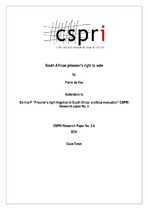South African prisoner's right to vote
Abstract
The South African Constitution states that every adult citizen has the right to vote. There has therefore been some legal controversy around the questions of whether it would be unconstitutional to limit the right of any prisoner to cast a vote in national elections. Before the last Parliamentary and Provincial national election in 1999 a group of prisoners challenged and order of the Electoral Commission which excluded all prisoners from voting. In the case of August and Another v Electoral Commission and Others. The Constitutional Court declared this action by the Commission invalid. However, the judgment did not authoritatively answer the question of whether prisoners could be denied the vote because the Court relied on the fact that the Commission had not acted in terms of a law of general limitation and their action could therefore not be constitutionally justified in terms of the limitation clause. When Parliament therefore amended the Electoral Act in 2003 to, in effect, deprive convicted prisoners serving sentences of imprisonment without the option of a fine of the right to participate in elections, it was predictable that the amendments would be challenged in Court. This duly happened and in Minister of Home Affairs v National Institute for Crime Prevention (NICRO) the Constitutional Court declared these amendments invalid. In this addendum I discuss the reasoning employed by the Court in this case, point out that the Court did not shy away from its Constitutional responsibilities to protect the unpopular and marginalised prison population and conclude that the case bodes well for any future prisoner’s rights litigation.

